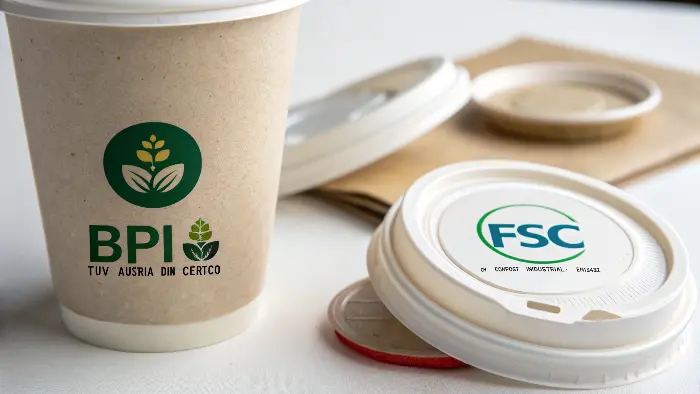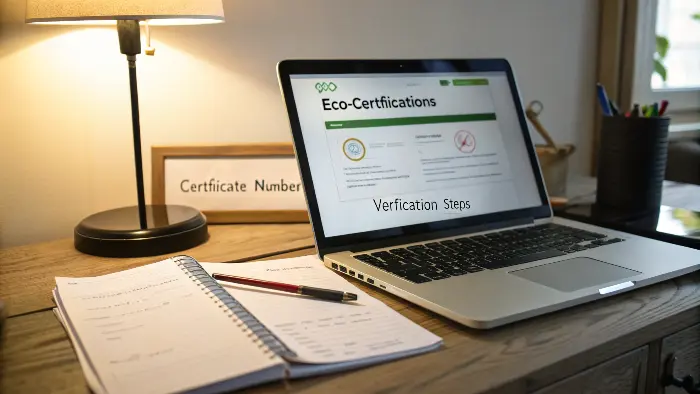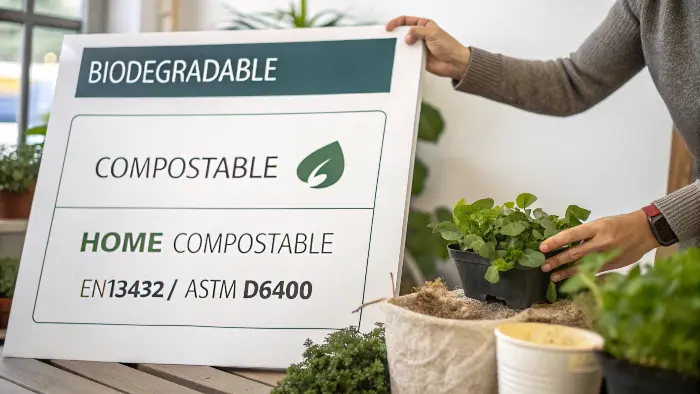Navigating eco-labels feels like a maze? Many importers are lost. You risk sourcing products that aren’t truly sustainable, or worse, non-compliant.
Eco-certifications are third-party verifications proving your disposable coffee accessories meet specific environmental standards, crucial for market access, brand credibility, and avoiding greenwashing accusations.
I talk to business owners and product importers like Jacky all the time, and let me tell you, the world of eco-certifications can be a real head-scratcher. You see all these logos and claims – "biodegradable," "compostable," "eco-friendly" – but what do they actually mean for the coffee cups, lids, stirrers, and sleeves you’re looking to import? It’s not just about looking green; it’s about being green and being able to prove it. If you’re importing these products, getting a handle on certifications isn’t just nice-to-have, it’s essential. Let’s dive into what you, as an importer, really need to focus on to make smart, sustainable choices for your business and your customers. Trust me, a little knowledge here goes a long, long way!
Why Are Eco-Certifications So Darn Crucial for My Imported Coffee Accessories?
Feeling overwhelmed by all the green labels? It’s easy to wonder if they’re worth the fuss. Ignoring them can lead to costly mistakes.
Eco-certifications offer vital proof of a product’s environmental claims, ensuring market acceptance, building consumer trust, and protecting your business from misleading suppliers.
So, why should you, an importer, even bother with all this certification stuff? Can’t you just take a supplier’s word for it if they say their coffee cups are "eco"? Well, I wish it were that simple! But in my experience, especially working with meticulous buyers like Jacky from Canada, relying on unverified claims is a recipe for trouble. Jacky’s brand reputation hinges on authentic sustainability, so he can’t afford to get it wrong. Certifications are basically your insurance policy in the green marketplace.
Digging Deeper: The Real Value of Certification for Importers
Let’s break down why these little logos pack such a big punch:
- Building Unshakeable Consumer Trust: Today’s coffee drinkers are savvy. They’re increasingly looking for brands that align with their values, and sustainability is high on that list. A recognized eco-certification mark (like BPI or TÜV Austria) on a coffee cup or lid is a clear, quick signal that your product has been independently verified. It’s not just you saying it’s green; a credible third party is backing it up. This builds immense trust and can be a powerful differentiator. I’ve seen cafes boost their loyalty simply by showcasing their certified compostable disposables.
- Meeting Regulatory and Market Access Requirements: This is a big one. Many countries and regions are implementing stricter regulations around single-use plastics and packaging waste. For instance, to legally claim a product is "compostable" in certain markets (like parts of Europe or North America), it often must meet specific standards like EN13432 or ASTM D6400 and be certified accordingly. Without the right certs, your shipment could be rejected at customs, or you could face fines. Jacky always tells me, "The first thing I check for is compliance with Canadian standards – no certification, no deal."
- Avoiding the Greenwashing Trap: "Greenwashing" – making false or misleading environmental claims – is rampant. Some suppliers might label a product "biodegradable" without any proof, or use vague terms that don’t mean much. Certifications cut through this noise. They provide specific, measurable criteria that a product has met. This protects your business’s reputation and ensures you’re genuinely contributing to sustainability, not just paying lip service to it. At Ecosourcecn, a core part of our mission is to connect buyers with suppliers whose certifications are legitimate and transparent. It’s about genuine impact, not just appearances.
Think of certifications as your quality control for sustainability claims. They’re not just fancy stickers; they are your gateway to responsible sourcing.Which Key Eco-Certifications Should I Be Looking For on Biodegradable Cups and Lids?
Staring at a cup and lid, wondering if the eco-claims are real? It’s confusing! You need to know which logos actually mean something.
For compostability, seek BPI (North America) or TÜV Austria/DIN CERTCO (OK compost INDUSTRIAL/EN13432 – Europe). For paper, FSC certification is key for responsible sourcing.

Okay, so you’re convinced certifications are important. Now, which ones should you actually be looking for when you’re sourcing things like PLA-lined paper cups or CPLA lids? It’s not like there’s just one "eco" stamp for everything! This is where things can get a bit like alphabet soup, but don’t worry, I’ll break down the main ones you’ll encounter for coffee accessories. Jacky often has a checklist of these when he evaluates potential new products for his brand.
Diving Deeper: Decoding the Main Compostability and Sourcing Certs
Here’s a rundown of the big players and what they signify for your cups and lids:
- BPI (Biodegradable Products Institute) – North America:
- What it means: This is probably the most recognized certification for compostable products in North America. If a product has the BPI logo, it means it’s been tested according to ASTM D6400 or D6868 standards and is designed to biodegrade safely and completely in a commercial composting facility.
- Why it matters for importers: If you’re selling into the US or Canadian markets, BPI certification is pretty much essential for compostable claims. It assures consumers and composting facilities that your product won’t contaminate the compost stream. Jacky will almost always prioritize BPI-certified items.
- TÜV Austria (OK compost INDUSTRIAL / SEEDLING Mark – EN13432) – Europe:
- What it means: This is the European gold standard. Products certified under EN13432 (often displaying the "Seedling" logo or "OK compost INDUSTRIAL") meet strict criteria for disintegration, biodegradation, absence of harmful substances, and effect on the final compost.
- Why it matters for importers: If Europe is your target market, this certification is crucial for market access and credibility. It’s very well-respected. There’s also DIN CERTCO, a German body that certifies to EN13432.
- FSC (Forest Stewardship Council) – Global (for paper products):
- What it means: While not about compostability, FSC is vital for any paper-based items, like your coffee cups or sleeves. The FSC logo ensures that the paper (or wood pulp) comes from responsibly managed forests that provide environmental, social, and economic benefits.
- Why it matters for importers: It shows your paper products aren’t contributing to deforestation. Customers are increasingly aware of this, and it’s a big part of a holistic sustainability story. We at Ecosourcecn always push for FSC-certified paper options.
- Home Compostability Certifications (e.g., TÜV Austria OK compost HOME):
- What it means: These are for products designed to break down in a home compost bin, which has lower, less consistent temperatures than industrial facilities. This is a higher bar to meet.
- Why it matters for importers: While less common for typical cafe disposables (most are designed for industrial composting), if a product does have this, it’s a strong selling point for consumers who compost at home.
When you’re looking at supplier spec sheets, don’t just see "compostable." Ask: "Certified by whom, and to what standard?" That’s the key question.How Can I Actually Verify if a Supplier’s Eco-Certification is Genuine and Not Just Greenwashing?
Worried about fake certificates? It’s a real risk. You need to ensure the eco-claims you’re importing are legitimate, not just clever marketing.
Verify certifications by checking the certifying body’s public database using the certificate number or company name. Always request the original certificate from the supplier.

This is a super important point, and one I discuss frequently with clients. Unfortunately, just because a supplier shows you a pretty logo or a scanned certificate doesn’t always mean it’s current, valid, or even real. Greenwashing is a sneaky beast! Jacky has told me stories about near-misses with suppliers whose claims didn’t quite add up upon closer inspection. So, how do you protect yourself and ensure the products you import are genuinely certified? You’ve got to do a little detective work.
Diving Deeper: Your Toolkit for Certification Validation
It’s not as hard as it sounds, but it does require diligence. Here’s how we at Ecosourcecn approach it, and how you can too:
- Always Request the Original Certificate: Don’t just accept a logo on a product image or a mention in an email. Ask the supplier to provide you with a copy of the actual certificate for the specific product you are interested in. Pay attention to the product codes or descriptions on the certificate to ensure they match what you’re buying.
- Check the Certifying Body’s Public Database: This is your most powerful tool! Reputable certification bodies maintain online, searchable databases of all the products and companies they have certified.
- BPI: You can search their certified product catalog on the BPI website.
- TÜV Austria: They also have an online certificate database where you can look up by certificate number, company name, or product type.
- DIN CERTCO: Similar online lookup tools are available.
- FSC: The FSC public certificate search is excellent for verifying claims about paper products.
I often walk clients through this process. "Let’s look up that certificate number right now," I’ll say. It’s amazing how quickly you can confirm validity (or raise a red flag!).
- Examine the Certificate Details Carefully:
- Validity Dates: Certifications are not forever. They have expiry dates. Is the certificate still current?
- Scope of Certification: Does the certificate cover the exact product you’re sourcing? Sometimes a company might have one product certified but imply all their products are.
- Company Name: Does the company name on the certificate match your supplier? Sometimes it might be the raw material manufacturer, which is okay, but you need to understand the chain of custody.
- Be Wary of Vague Claims or "Self-Made" Certifications: If a supplier is evasive, can’t provide a certificate number, or offers up a very generic "eco-friendly" certificate from an unknown body, that’s a major warning sign.
This verification step is critical. It’s what separates responsible sourcing from risky business. It’s a bit of extra work, sure, but it protects your brand, your customers, and your peace of mind. Jacky once mentioned how this diligence saved his company from importing a large batch of cups that, despite claims, lacked proper North American compostability certification. That would have been a costly mistake!What Are the Real Differences Between "Biodegradable," "Compostable," and "Home Compostable" Certifications?
Terms like "biodegradable" and "compostable" get thrown around a lot. Are they the same? Understanding these distinctions is key to choosing truly eco-friendly items.
"Biodegradable" is a vague term. "Compostable" (EN13432/ASTM D6400) means it breaks down in industrial facilities. "Home Compostable" means it breaks down in home compost conditions.

Ah, the classic terminology tangle! "Biodegradable," "compostable," "industrially compostable," "home compostable"… it’s enough to make your head spin, right? I spend a good chunk of my time explaining these differences because they are not interchangeable, and using the wrong term can be misleading. When Jacky is training new team members in his packaging department, this is one of the first things he clarifies. Getting this right is fundamental.
Diving Deeper: Untangling the Eco-Jargon for Importers
Let’s clearly define these terms, especially in the context of certifications:
- "Biodegradable":
- The Vague Claim: Technically, everything is biodegradable given enough time (hundreds or thousands of years for some plastics!). So, as a standalone claim, "biodegradable" without a timeframe or specific conditions is pretty meaningless and often a greenwashing tactic. There are some certifications for biodegradability in specific environments (like marine or soil), but for coffee accessories, this term is often less helpful than "compostable."
- What to watch for: If a product only says "biodegradable" and doesn’t reference a specific standard or timeframe, be skeptical. Ask for more details!
- "Compostable" (Specifically Industrial/Commercial Compostable):
- The Standard: This is the most relevant term for most disposable coffee accessories like PLA-lined cups or CPLA lids. When a product is certified "compostable" to standards like EN13432 (Europe) or ASTM D6400 (North America), it means it will break down into natural elements (carbon dioxide, water, biomass) within a specific timeframe (usually 90-180 days) under the controlled conditions of an industrial or municipal composting facility (i.e., high temperatures, specific moisture, and microbial levels).
- Key Certifications: BPI, TÜV Austria (OK compost INDUSTRIAL), DIN CERTCO (Seedling logo).
- Why it matters: These products are designed for a specific end-of-life. They won’t just disappear in a landfill or your backyard.
- "Home Compostable":
- The Higher Bar: This means the product is certified to break down in the conditions of a typical home compost pile or bin, which are much cooler and less consistent than industrial facilities. This usually takes longer.
- Key Certifications: TÜV Austria (OK compost HOME), DIN CERTCO (DIN-Geprüft Home Compostable).
-
Why it matters: This is a more challenging standard to meet. While great for consumers with home composts, not all "industrially compostable" items are "home compostable." It’s important not to confuse the two. If your target customer is likely to use home composting, this certification is a big plus.
Here’s a simple way I explain it to clients:Term Environment Certification Examples Key Takeaway for Coffee Accessories Biodegradable Varies (often vague) Few specific for packaging Be cautious; seek compostability certs instead. Compostable (Industrial) Industrial Facility BPI, EN13432 (TÜV/DIN CERTCO) Standard for most eco coffee cups/lids. Home Compostable Home Compost Pile TÜV OK compost HOME, DIN CERTCO Home Ideal for direct consumer use if they home compost. Understanding these nuances helps you make informed choices and accurately communicate the benefits (and limitations) of your products. It’s all about setting the right expectations!
Conclusion
Navigating eco-certifications is vital for importers. They ensure product compliance, build trust, and genuinely support sustainability goals. Choose wisely, verify thoroughly.


